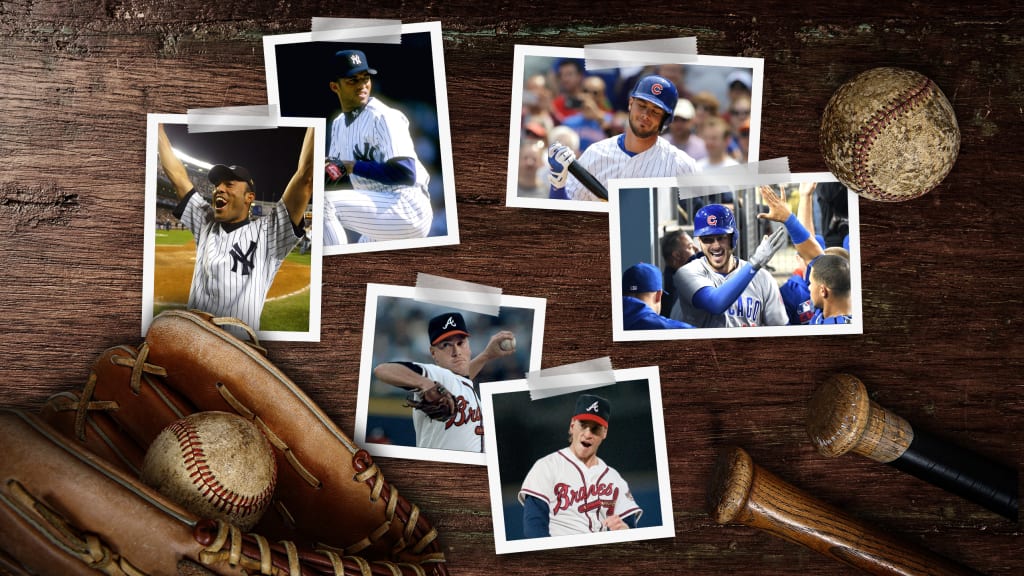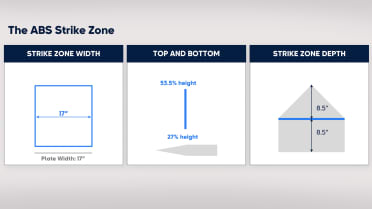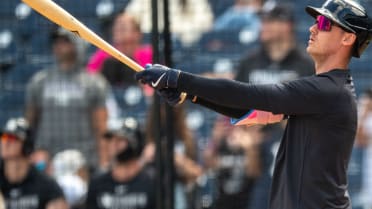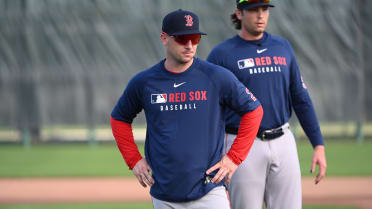After rough debuts, these stars began to shine

Every player dreams of getting to the Major Leagues, but once there, that first taste of action does not always go as planned.
Of course, some stars shine from the get-go. Stephen Strasburg struck out 14 batters in his dominant, hotly anticipated debut in 2010. Trevor Story launched two home runs in his first big league game in '16, igniting a historic opening week.
Not everyone sees such immediate results. Sometimes a debut goes about as poorly as can be -- even if greatness is in the player’s future. So let these 10 notable players, past and present, be an inspiration to any future arrivals whose first game goes awry. It can get better, and fast.
Players are listed in reverse order of debut date.
Alex Bregman, 3B, Astros
July 25, 2016, vs. Yankees: 0-for-4, 2 K
The debut: Thrown into the fire against the Yankees -- at third base, a relatively unfamiliar position at the time -- the 22-year-old top prospect handled himself defensively. But he also left a total of six runners on base in a 2-1 loss. He nearly hit a go-ahead grand slam in the sixth, but his deep fly ball to right was caught on the warning track. In fact, Bregman’s win probability added (WPA) of -0.288 ranks as the 14th-lowest for a hitter in his debut, going back to 1901. Yet Bregman, never one to lack confidence, was hardly troubled by the results.
The rebound: Bregman actually started 0-for-18 and was 1-for-32 through eight games. But then he hit .308/.355/.562 over the rest of the season (41 games). By 2018, he was one of the top performers in MLB.
Kris Bryant, 3B, Cubs
April 17, 2015, vs. Padres: 0-for-4, 3 K
The debut: After an enormous spring, the Cubs sent Bryant back to Triple-A to begin 2015, before an injury quickly opened a spot. Yet Bryant whiffed in each of his three plate appearances against veteran pitcher James Shields -- the last with two runners in scoring position -- and grounded out with two on and two out in the seventh, with the Cubs down a run. Bryant showed his aptitude at the hot corner, but the results at the plate weren’t there in a 5-4 loss. “You’ve got to embrace the times you’re not doing well and realize it’s a part of the game and hope to grow from it,” Bryant said afterward.
The rebound: Bryant went 2-for-3 with three walks the next day, and while it took him 21 games to homer, he went on to win the National League Rookie of the Year Award. One year later, he was the NL MVP.
Carlos Carrasco, SP, Cleveland
Sept. 1, 2009, at Tigers: 3 IP, 9 H, 6 R, 6 ER, 3 BB, 3 K
The debut: Cleveland gave Carrasco a September callup after acquiring him in the Cliff Lee trade that summer, but things went wrong right away in a loss at Comerica Park. The first six batters Carrasco faced in the Majors all reached base, including back-to-back homers by Placido Polanco and Carlos Guillen, as part of a four-run first. Carrasco became the sixth starting pitcher in history to allow at least six earned runs and three homers in no more than three innings in his debut.
The rebound: Carrasco posted an 8.87 ERA in his five starts in 2009 and dealt with injuries and inconsistency during the ‘13 season. But he eventually matured into one of MLB’s best starters from 2015-18, and later fought his way back to the mound after going through treatment for leukemia.
Derek Jeter, SS, Yankees
May 29, 1995, at Mariners: 0-for-5, K
The debut: It’s hard to believe, but Jeter -- the Captain, Mr. November, five-time champion -- owns the third-most un-clutch MLB debut of any hitter in Yankees history (at least in terms of his -0.231 WPA). As MLB.com’s Mark Feinsand detailed, a 20-year-old Jeter got the call for a game at the Kingdome but couldn’t come up with his first hit. Already 0-for-3, Jeter got two shots to make something happen late in a tie game but grounded out in the ninth and struck out with a man aboard to end the 11th in what would be an 8-7 loss.
The rebound: Jeter did get two hits the following day but was soon sent down, telling the media upon his departure, “I’ll be back eventually.” Sure enough, Jeter was the Yankees’ starting shortstop in 1996, earning American League Rookie of the Year honors.
Mariano Rivera, SP, Yankees
May 23, 1995, at Angels: 3.1 IP, 8 H, 5 R, 5 ER, 3 BB, 5 K
The debut: While Jeter was already playing shortstop in May 1995, Rivera had not yet found his calling. The 25-year-old had been a full-time starter in the Minors over the previous few seasons, and that’s how he arrived in The Show, filling in for the injured Jimmy Key. After beginning with three strikeouts over two scoreless innings, Rivera allowed two runs in the third and a three-run homer to Jim Edmonds in the fourth. One batter later, he was out of the game, down 5-0 in an eventual 10-0 loss.
The rebound: After three more shaky starts, Rivera was sent back to the Minors, along with Jeter. Both were “devastated,” according to Rivera. Mo returned for the best start of his career on July 4 against the White Sox (eight scoreless innings, 11 strikeouts), but the truly momentous event was when he moved to the Yankees bullpen that September.
Tom Glavine, SP, Braves
Aug. 17, 1987, at Astros: 3.2 IP, 10 H, 6 R, 6 ER, 5 BB, 1 K
The debut: The 21-year-old lefty was in trouble immediately at the Astrodome and allowed two runs on four hits in the first inning. He did so again in the third and was knocked out in the fourth inning of an 11-2 blowout. Glavine remains the only pitcher since Squire Potter in 1923 to allow 15 baserunners in fewer than four innings in his debut.
The rebound: After telling the Atlanta Journal-Constitution that, “If I worry about what happened, it won’t do me any good,” Glavine came right back five days later and pitched 7 1/3 solid innings against the Pirates to notch the first of his 305 career wins. Glavine was in the Majors for good by 1988 and a Cy Young Award winner in ‘91, on his way to Cooperstown.
Roger Clemens, SP, Red Sox
May 15, 1984, at Cleveland: 5.2 IP, 11 H, 5 R, 4 ER, 3 BB, 4 K, HBP
The debut: Clemens had been a collegiate star at Texas, a first-round pick and a hot prospect before arriving in the Majors at 21. But his first game was hardly festive, played in front of a crowd of barely 4,000 at Cleveland Stadium. While Clemens managed to limit the runs somewhat, taking a no-decision in a 7-5 loss, he allowed 15 baserunners -- not to mention six steals in six attempts.
The rebound: Clemens had a 7.13 ERA through six starts but a 3.31 ERA over his final 14 as a rookie. Just two years later, he was the AL MVP and took home the first of his record seven Cy Young Awards.
Hank Aaron, LF, Braves
April 13, 1954, at Reds: 0-for-5
The debut: Aaron was barely 20 years old when he made the Milwaukee Braves’ roster out of Spring Training in 1954. He batted fifth on Opening Day at Crosley Field, two spots behind fellow future Hall of Famer Eddie Mathews. But it wasn’t Aaron’s day. While he put the ball in play, the man who would become MLB’s all-time RBI leader squandered several chances, including in his final plate appearance, when he flied out to end the top of the eighth with the potential tying run on base. The Braves lost, 9-8.
The rebound: Aaron got two hits in his next game and soon hammered the first of his 755 home runs. While a fractured ankle limited him to 122 games, he was a better-than-league-average hitter as a 20-year-old and an All-Star the next year.
Willie Mays, CF, Giants
May 25, 1951, at Phillies: 0-for-5, K
The debut: Early in 1951, Mays was batting .477/.524/.799 (no, really) in 35 games for the Triple-A Minneapolis Millers, when the Giants brought him up during a sub-.500 start. He was fewer than three weeks past his 20th birthday. Manager Leo Durocher put Mays in the third spot in the lineup at Philadelphia’s Shibe Park, and according to The New York Times, Mays, “brought rounds of ‘ah’s’ from the early arrivals by driving three tremendous drives into the left field stands,” during batting practice. He hit a couple more shots in the game, but both turned into loud outs, and he wound up hitless, leaving two runners on to end the top of the seventh with his team down by two runs. Mays did reach on an error in the eighth, however, and the Giants rallied to win.
The rebound: Although he hit his first career homer off Warren Spahn on May 28, Mays actually started just 1-for-26 over his first seven games, and Durocher dropped him to eighth in the lineup. From that point, he hit .288/.363/.491 with 19 homers in 114 games, winning the NL Rookie of the Year Award.
Carl Hubbell, SP, Giants
July 26, 1928, vs. Pirates: 1.2 IP, 7 H, 7 R, 2 ER, 0 BB, 1 K
The debut: Purchased by the Giants from the Texas League earlier that month, the 25-year-old screwball artist reported to the Polo Grounds, where manager John McGraw put him on the mound. The initial return was not promising, inspiring The New York Times to write that Hubbell, “was battered from the box by a flurry of Pirate hits after the infield had collapsed behind him.” Three Giants errors did in fact help produce the seven-run second inning that knocked Hubbell from the game, but he remains one of 13 starting pitchers to allow at least seven runs without completing two frames in his debut.
The rebound: After a stint in the bullpen, Hubbell shut out the Phillies in his second start on Aug. 11. He finished the year with a 2.83 ERA, became a staple of the Giants’ rotation and won a pair of NL MVP Awards on his way to the Hall of Fame.
10 more notable active players with tough debuts
• Julio Rodríguez (April 8, 2022): 0-for-4, 2 K
• Devin Williams (Aug. 7, 2019): 1.2 IP, 3 H, 2 R, 0 ER, 1 BB, 3 K
• Jack Flaherty (Sept. 1, 2017): 4 IP, 8 H, 5 R, 5 ER, 1 BB, 6 K
• Byron Buxton (June 14, 29015): 0-for-4, 2 K
• Anthony Rendon (April 21, 2013): 0-for-4, 2 K
• Mike Trout (July 8, 2011): 0-for-3
• Freddie Freeman (Sept. 1, 2010): 0-for-3, K
• Chris Sale (Aug. 6, 2010): 2 batters faced, 1 H, 1 BB (as a RP)
• Adam Wainwright (Sept. 11, 2005): 1 IP, 2 H, 3 R, 3 ER, 1 BB, 0 K (as a RP)
• Justin Verlander (July 4, 2005): 5.1 IP, 7 H, 4 R, 4 ER, 3 BB, 4 K (loss)
Andrew Simon is an editor and writer for MLB.com.




